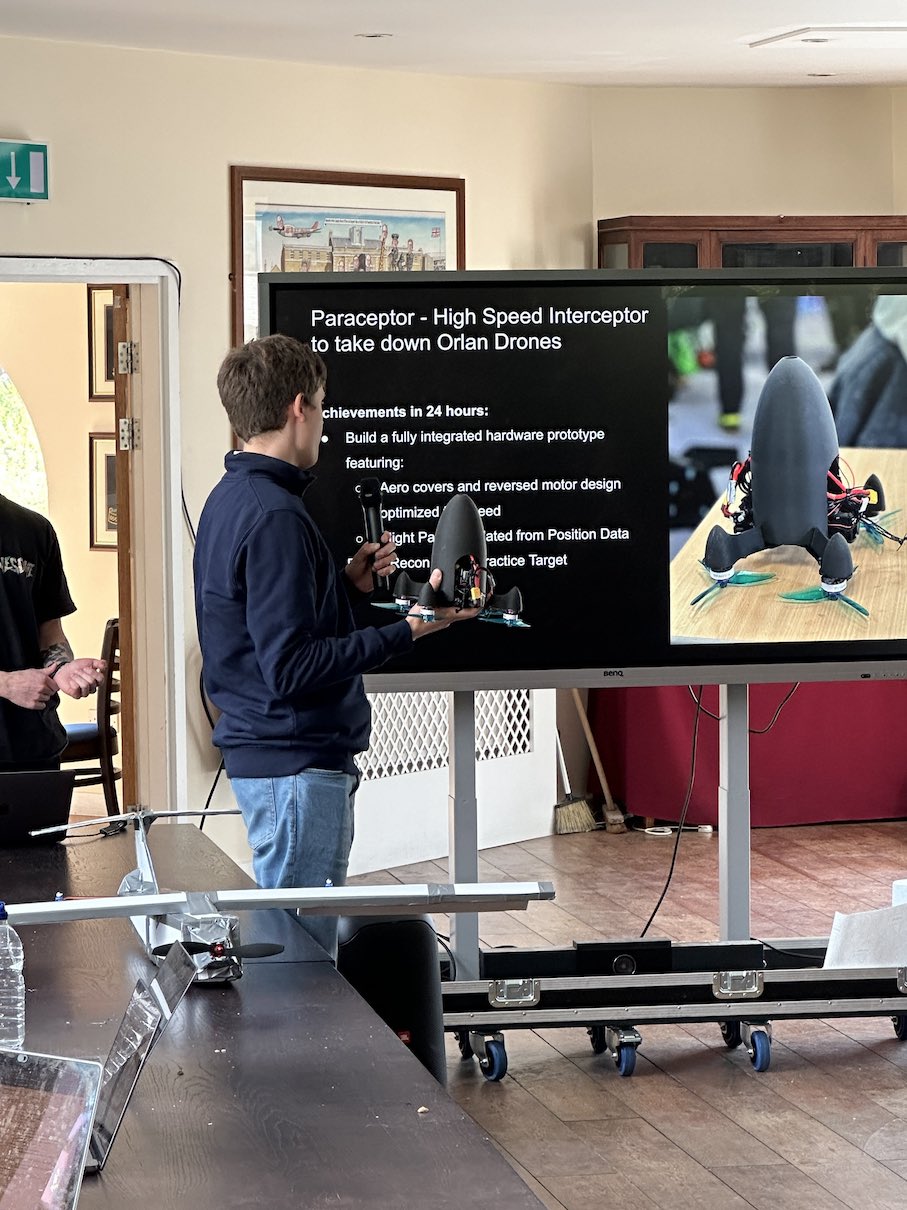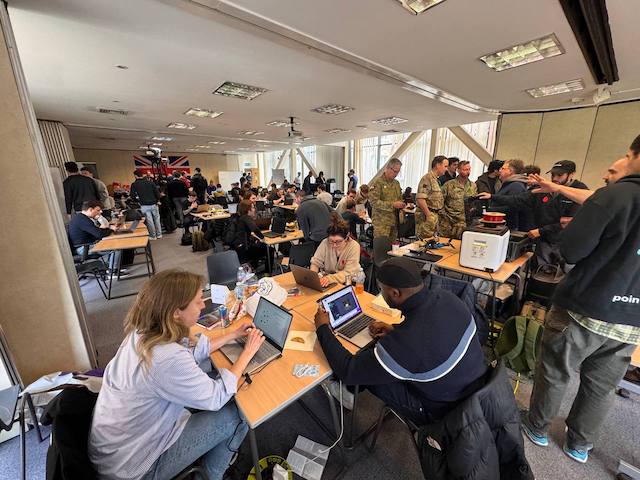Last week, the U.K. announced its largest ever military support package for Ukraine. The bill brings the U.K.’s total support for this financial year to £3 billion — not quite the $50 billion the U.S. pledged recently, but still substantial.
But while most of those funds will be spent on very traditional military hardware, a new tech initiative launched last weekend was aimed at enhancing Ukraine’s asymmetric warfare capabilities against Russia. In fact, the London Defense Tech Hackathon was the first-ever event to bring together some of the U.K.’s brightest minds in technology, venture capital, and national security in a military setting. The idea was to hack together ideas to both assist Ukraine and create a far more porous layer between the worlds of fast-paced civilian tech and the very different world of the military.
The event was put together by Alex Fitzgerald of Skyral and Richard Pass of Future Forces, and the two were joined by co-organizers that included the Honourable Artillery Company, Apollo Defense, Lambda Automata and D3 VC among others.
The event brought together developers skilled in both hardware and software to foster innovation in defense, national security, and deep tech. There was a key focus on drones and their applications on the battlefield, both the hardware and the electronic systems needed to fly them to their targets and counter-drone systems.
As most observers of the war have pointed out, this war has taken on a completely new dimension compared to previous wars. Today, drones and electronic countermeasures are the order of the day, as Ukraine has endeavored to fight off Russia, a much larger aggressor, with asymmetric methods.
Fitzgerald told me: “There are three groups of people coming to these events. There’s the builders, investors, and the military. I think for everyone, it’s trying to convince their colleagues to think more about defense technology as an option to either build or invest in.”
He explained that there were two main tracks of work: electronic warfare and drone or aerial systems: “There’s an acronym I learned from someone cleverer than me, which is that the future of defense technologies comes small, cheap and uncrewed.”
He explained that one main aim was to get people who had traditionally not been involved in defense either building for or investing in defense: “We’ve got people like the NATO Innovation Fund, the UK National Security Strategic Investment Fund. So yeah, it’s a mix of people who already invest in defense or who haven’t thought about investing before.”
He chose the hackathon format because “the focus is on getting stuff done. Get actual builders, not to just talk about building, because that’s actually where most of the innovation is happening.”

One of the inspirations for the event was the recent El Segundo, California, defense tech hackathon in February of this year.
“I think the key thing with military technology is making it as easy to use and as powerful as some of the consumer technology that’s been built,” said Fitzgerald. “There’s the classic line, ‘There’s more AI in a snap in Snapchat than there is often some most modern military systems.’”
Also attending the event was Catarina Buchatskiy, representing Apollo Defense. As engineers pored over cameras, Starlinks, and drones, she told me: “Defense tech is a difficult industry to enter. And it’s a difficult market to break into, for obvious reasons. We’ve found hackathons an extremely exciting way for people to get involved because defense technology can seem like a giant black box of contracts that take 10 years, and technologies that are built [are often] hidden from the public eye. At a hackathon, you have 24 hours. Make something really cool.”
She said the firm had seen “a lot of success” with the El Segundo event.
“We just realized that if people think it’s something that’s accessible to them [and] can do something quickly and make an impact, they want to participate,” she told me.
Buchatskiy, who is Ukrainian, also spoke powerfully about Ukraine: “These are very real things to me. When I say that I need a drone detector, it’s because I’m looking at one outside my window that we didn’t detect in time and it is going to kill my neighbor. That is the reality that we face.”
She added that it’s important for hackathon attendees to know “that they’re building for someone and this could actually save my family’s life.”
Despite the controversy surrounding defense technology in some quarters, she added, “To be involved in technology is to be interested in a better future. And I really, truly can’t think of a more interesting and better future than one that’s safe and one where we can guarantee peace.”
NATO, in the shape of the NATO Investment Fund, a fund with a billion euros to invest in defense tech over the next few years, was also represented.
Fund partner Patrick Schneider-Sikorsky told me the fund was set up to back startups “that bolster our collective defense security and resilience. We invest in dual-use deep tech, but the fund was conceived before the war in Ukraine. The conflict has now very much impacted our investment thesis and we’re keen to invest in defense technologies that can make Europe safer and more secure.”
But why was NATO funding a hackathon?
“I think defense tech is new to a lot of founders and a lot of developers,” Schneider-Sikorsky said. “It’s not that easy for them to understand the problem statements and the challenges and also to get access to the end users.”
He said the hackathon format particularly lends itself to that: “It would normally, for many founders, take them months if not years to get in touch with the right people at defense ministries, and a lot of them are here today. So hopefully it will accelerate things substantially.”
Another attending investor, Alex Flamant from HCVC, told me: “There was a need for people in Europe to invest in proper defense technologies. It seemed from the investor standpoint, there’s restrictions around certain investors investing. One of the goals of this is to demystify what a lot of this is amongst young builders, and really to get people more aligned with the big mission that we’re all on.”
Rula Awad, a machine learning specialist, was there to focus on drone detection: “That’s in our machine vision and object detection knowledge. Ukraine are fighting for the whole of Europe at the moment and obviously the U.K. is pivotal to that. It’s essential that we ally with them and utilize what we have to help.”
The hackathon came at a time of increased tension around the use of technologies in defense.
Google recently fired 28 employees after their sit-in protest over the controversial Project Nimbus contract with Israel, for instance.
However, defense is clearly rising up the tech agenda.
Anduril recently moved ahead in a Pentagon program to develop unmanned fighter jets, and more broadly as we learned last year, venture capital is opening the gates for defense tech.
And in the U.K., there is much talk about how high-powered lasers could be among the next wave of weapons. The DragonFire weapon is said to be precise enough to hit a £1 coin from a kilometer away, according to the MoD, and cost barely $15 to fire.
The projects to emerge from the hackathon may not have been quite so sci-fi, but they were pretty damn close. How about a “High Speed Interceptor to take down Orlan Drones”? And at least they are likely to be deployed a lot sooner than a laser gun.






























Comment